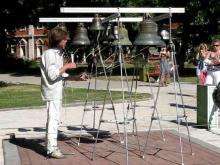Bell-ringer

A bell-ringer is a person who rings, tolls or peals a large bell, usually a church bell, by tugging on a long rope. Since the invention of the carillon, the need for bell ringers has declined. Also some churches have replaced bell-ringing altogether with a loudspeaker that plays bell music from a computer or music player.
The profession saw spectacular revival in Russia, paralleling growth of the Russian Orthodox Church influence (see Russian Orthodox bell ringing).
Secrets of the skill of bell ringers in Russia passed from generation to generation, but in the 20th century this art was almost lost. The training took place only at workshops until 2008. Then the first permanent bell-ringer school opened in Moscow, under the leadership of Drozdihin Ilya.[1]
Hazards
In the Middle Ages, it was believed that the sound of a bell could disperse thunder.[2] A large number of bell-ringers were electrocuted as a result. In France between the years 1753 and 1786, 103 bell-ringers were killed during thunderstorms as a result of holding on to wet bell ropes. The Parlement of Paris enforced an edict in 1786 to prohibit the practice.[3] Deaths likely continued until the 19th century, when the lightning rod came into general use.
See also
- Bolognese bell ringing art
- Change ringing
- Campanology
- Christmas kettle
- Theodore the Bellringer
- Russian Orthodox bell ringing
References
| Wikimedia Commons has media related to Bell ringers. |
- ↑ "Russia. The TV channel "Culture". The school bell ringers opens in Moscow". Tvkultura.ru. 2008-10-15. Retrieved 2014-06-15.
- ↑ White, Andrew Dickson (1896). "Chapter XI : From "The Prince Of The Power Of The Air" To Meteorology". The Warfare of Science With Theology.
- ↑ Burke, James (1978). Connections. Boston: Little, Brown. p. 34. ISBN 0-316-11681-5.
| ||||||||||||||||||||||||
